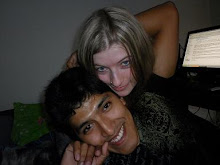What helped me learn a lot of Spanish was my choice of books and audio, and so with Italian I want to learn in a similar way so that I can get to a simlar level. Of course after a while I´ll be using what I learned on a regular basis by having conversations, reading, watching movies, etc.
My list of materials includes the first 2 books which I´ve finished, the 3rd, which I´m currently working on, and as for the rest - Teach Yourself Improve Your Italian is on the way - I ordered it a few days ago. I also have Practice Makes Perfect: Advanced Italian Grammar, the two Schaum´s books and the self-teaching guide here already. I have some books at my house in Winnipeg too which I guess I´ll add. The rest are just possible materials I´ll use in the future. I liked the description and reviews on amazon. It´s almost 100% certain that I won´t (and won´t need to) use all the materials!
Just as with Spanish, it will take probably a couple or few years to finish everything I want to finish before only reading, watching movies and having conversations. There are just too many things I want to be able to do in addition to study Italian (like enjoy books in Spanish, teach English to Spanish speakers, and perhaps dabble a bit in one or two new languages) so completing most of the list will take a while.
I´ve stopped with French and Portuguese for now but I don´t plan on abandoning them forever. I just want to focus most of my efforts on Italian. My French is better than my Portuguese though. I´ve forgotten a lot of what I learned with Pimsleur´s Portuguese program but when I start studying French again I think I´ll pick it up/advance much more easily. And the good thing with French too is that there is way more material available than for Portuguese. It´s kind of frustrating that Portuguese grammar workbooks aren´t so readily available. I´d love to buy a whole series of PMP Portuguese books like I´ve done with the Spanish ones.
My Italian Self-Study
1. Italian the Easy Way (done)
2. Practice Makes Perfect: Complete Italian Grammar (done)
3. Barron´s Complete Italian Grammar Review (currently working on)
4. Schaum´s Outline of Italian Vocabulary
5. Teach Yourself Improve Your Italian with CD
6. Practice Makes Perfect: Advanced Italian Grammar
7. Schaum´s Outline of Italian Grammar
8. Italian: A Self-Teaching Guide
9. Practice Makes Perfect: Italian Verb Tenses
10. Practice Makes Perfect: Italian Sentence Structure
11. Italian Verb Drills (I had already finished a good chunk of this book but it´s in Winnipeg)
12. Colloquial Italian 2 with CD
13. Practice Makes Perfect: Italian Conversation
14. Practice Makes Perfect: Italian Pronouns and Prepositions
15. Read & Think Italian with CD
16. Ultimate Italian Advanced
17. Hippocrene Mastering Advanced Italian
My list of materials includes the first 2 books which I´ve finished, the 3rd, which I´m currently working on, and as for the rest - Teach Yourself Improve Your Italian is on the way - I ordered it a few days ago. I also have Practice Makes Perfect: Advanced Italian Grammar, the two Schaum´s books and the self-teaching guide here already. I have some books at my house in Winnipeg too which I guess I´ll add. The rest are just possible materials I´ll use in the future. I liked the description and reviews on amazon. It´s almost 100% certain that I won´t (and won´t need to) use all the materials!
Just as with Spanish, it will take probably a couple or few years to finish everything I want to finish before only reading, watching movies and having conversations. There are just too many things I want to be able to do in addition to study Italian (like enjoy books in Spanish, teach English to Spanish speakers, and perhaps dabble a bit in one or two new languages) so completing most of the list will take a while.
I´ve stopped with French and Portuguese for now but I don´t plan on abandoning them forever. I just want to focus most of my efforts on Italian. My French is better than my Portuguese though. I´ve forgotten a lot of what I learned with Pimsleur´s Portuguese program but when I start studying French again I think I´ll pick it up/advance much more easily. And the good thing with French too is that there is way more material available than for Portuguese. It´s kind of frustrating that Portuguese grammar workbooks aren´t so readily available. I´d love to buy a whole series of PMP Portuguese books like I´ve done with the Spanish ones.
My Italian Self-Study
1. Italian the Easy Way (done)
2. Practice Makes Perfect: Complete Italian Grammar (done)
3. Barron´s Complete Italian Grammar Review (currently working on)
4. Schaum´s Outline of Italian Vocabulary
5. Teach Yourself Improve Your Italian with CD
6. Practice Makes Perfect: Advanced Italian Grammar
7. Schaum´s Outline of Italian Grammar
8. Italian: A Self-Teaching Guide
9. Practice Makes Perfect: Italian Verb Tenses
10. Practice Makes Perfect: Italian Sentence Structure
11. Italian Verb Drills (I had already finished a good chunk of this book but it´s in Winnipeg)
12. Colloquial Italian 2 with CD
13. Practice Makes Perfect: Italian Conversation
14. Practice Makes Perfect: Italian Pronouns and Prepositions
15. Read & Think Italian with CD
16. Ultimate Italian Advanced
17. Hippocrene Mastering Advanced Italian












